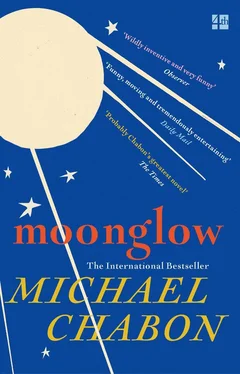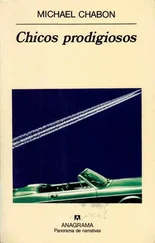He went to his workbench and took down a gaudy Romeo y Julieta cigar box. He removed a bundle of tissue paper from the box and unwrapped a circular structure fashioned from a take-out coffee-cup lid. He had initially completed the moon garden in May 1975, pillaging tiny n- and British OO-scale model train kits to fill it with flowering shrubs, rosebushes, and vegetables grown in hydroponic racks. With a careful thumbnail he lifted the lid’s sipping flap, which he had reconfigured as an access hatch. He peered in to check on the family who had replaced the original lovers as occupants of the moon garden. On a sling bench and two sling chairs of his own design, enjoying moist and oxygenated air, sat figures representing my grandfather and grandmother, my mother, and my brother and me. The figures were posed stiffly (even for polystyrene people), as if for a formal photograph. Everyone safe and sound.
My grandfather lowered the flap. He carried the moon garden to the model of LAV One and fitted it into the hole that awaited it. He was not aware of any great sense of accomplishment. It was a job he had left undone for too long, a promise too long unkept, and what he felt most was relief.
Six months later he would be dead.
The next morning, well before dawn, my grandfather went out into the dense Florida darkness to load the trunk of his Buick LeSabre for a trip to Cape Canaveral. There had been no launches since the Challenger disaster nearly four years earlier. Now another shuttle, Discovery , was scheduled to lift off that morning at ten. He had filled a bait cooler with a freezer pack, a bottle of Michelob, a plastic food container of cut-up pineapple, and two meat salad sandwiches. Meat salad was a specialty of my grandfather’s. You passed a piece of leftover roast through a meat grinder with some dill pickles, a couple tablespoons of mayonnaise, salt and pepper. Like many of my grandfather’s specialties, meat salad tasted better than it looked or sounded, served on a nice challah roll. He put the cooler into the trunk with a pair of binoculars, a secondhand Leica with a brand-new telephoto lens, the latest issue of Commentary , a transistor radio, a gallon of tap water, and a reclining folding chair, complete with a footrest and a sun umbrella you could attach to the chair’s frame. He had made the sun umbrella himself, surgically replacing the handle of a rain umbrella with a C-clamp.
Like any habitation of the elderly, Fontana Village was rich in insomniacs and early birds, but for the moment my grandfather had the morning to himself. Before closing the trunk of his car, he leaned against the rear bumper and listened to the silence. It was not perfect. It was never perfect. But he had come to appreciate how small or distant sounds could intensify it, the way a drop of blue paint intensified whiteness. The tick-tick of an insect or possibly a frog. A big rig downshifting out on I-95. Mist effervescing in the beams of the security lighting. Underlying everything, the low-pitched tinnitus that was the sound of Fontana Village itself, a compound hum of air conditioners, vending machines, circuit breakers, swimming-pool filtration systems, poorly insulated wire. A woman’s voice, far away, calling out, “Ramon!”
My grandfather straightened up. He angled his head, his ear a dish attuned to the cosmic background radiation. He shuffled the short deck of Ramons he had encountered in his life. None of them lived in Fontana Village. There were some Cubans living at Fontana Village, and they sometimes had first names like Adolfo and Raquel, but they were Jews like everybody else, Goldmans and Levys come to the promised land of South Florida along a different branch of the river of exile. He did not know any of the Cuban Jews well. One of them might well be Ramon. Ramon Lifschitz. Ramon Weinblatt. From time to time some poor bastard with dementia went walkabout, and you would see his wife or the home care nurse running after him, shouting his name.
“Ra mon ! Hee -er, kittykittykitty.”
The voice seemed to be coming from the direction of the Jungle, as the residents of Fontana Village called the wasteland that bordered the retirement village to the north and east. In the Jungle, nuisance plants and Bermuda grass gone feral had been at war with native stranglers since the late seventies, contending for ownership over five hundred acres that was briefly a golf course and country club. Somewhere in that tangle a devourer of pets, widely believed to be an alligator, plied its leisurely trade.
“Ra mo -ohn!”
On the second syllable the woman’s voice broke like a bar mitzvah boy’s. There had been amusement in her frustration before, but that was gone now.
My grandfather looked at his watch, which he wore with the face on the inside of his wrist. It was already past five-thirty, and the trip north would take about three and a half hours, four if he stopped for gas and a toilet break. The return to service of the shuttle fleet had attracted considerable interest in the media, and traffic might be heavy. He really could not afford delay.
“God damn you, lady,” my grandfather said.
He opened the well that held his tire-repair kit and took out the socket wrench without thinking about it or knowing why. He slammed shut the lid of the trunk. It thudded like a kettledrum in the humid air.
He crossed the parking lot, nervously gripping and renewing his grip on the shaft of the tire wrench, to a walkway lit at intervals. If you went right, the walkway led past the swimming pool that served this end of the complex. To the left, it wandered around the back of the cluster that included his own two-bedroom unit to a service area with a charging station for the carts that village residents used to get around. Past the service area, you came to a fairly wide strip of lawn backed by a running wooden rail about a foot high. After that, things became primeval.
My grandfather’s leather sandals, imitation Birkenstocks of Israeli manufacture, slapped against the pavement. It was an angry sound. He was annoyed with Ramon, whom he pictured lean and cross-eyed, skulking into the Jungle to meet his death, just for a taste of rat or nutria. He was annoyed with Ramon’s owner for coming out to look for Ramon when it was still pitch-dark and there was, at any rate, nothing to be done. There was nothing to be done, and yet off he went to try and do it; my grandfather was annoyed, most of all, with himself. The louder his sandals slapped against the pavement, the angrier he became. He found himself hoping that when he reached the edge of the Jungle, he really did encounter the alligator so that he could beat it to death with the socket wrench. That was the purpose, he now understood, for which he had taken the tool out of his trunk.
He crossed the northernmost of the lawns serviced by the groundskeepers of Fontana Village. The soles of his sandals kicked up pinpricks of dew that stung his shins. He was wearing khaki shorts, one of seven identical pairs he had purchased at Kmart, to go with the seven polo shirts and seven pairs of white tube socks, which he always wore with sandals, that constituted his daily uniform after my grandmother died. If it was somebody’s birthday or some function he could not avoid, he would put on a Hawaiian shirt, decorated with bare-breasted hula girls, that I had given him as a joke. The shirt had scandalized some of his fellow villagers, but my grandfather had no regard for anyone who could be scandalized by a shirt.
Out here past the service area, it was too dark to see. My grandfather took out Aughenbaugh’s Zippo and struck a light. Tiny beads of moisture in the air trapped the light before it could travel very far. Light enveloped his hand like a ball of St. Elmo’s fire.
“Hello?” said the woman. “Who’s that?”
Читать дальше












